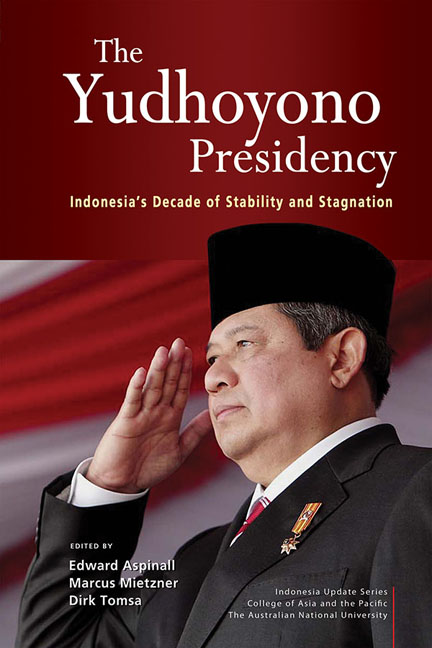Book contents
- Frontmatter
- Contents
- Tables and figures
- Contributors
- Acknowledgments
- Glossary
- 1 The moderating president: Yudhoyono's decade in power
- 2 Prologue Yudhoyono's legacy: an insider's view
- PART 1 PERSONAL, COMPARATIVE AND INTERNATIONAL PERSPECTIVES
- PART 2 INSTITUTIONS, POLITICS AND SECURITY
- 6 A balancing act: relations between state institutions under Yudhyono
- 7 Professionalism without reform: the security sector under Yudhoyono
- 8 Yudhoyono's legacy on internal security: achievements and missed opportunities
- 9 Toning down the ‘big bang’: the politics of decentralisation during the Yudhoyono years
- 10 The rule of law and anti-corruption reforms under Yudhoyono: the rise of the KPK and the Constitutional Court
- PART 3 GENDER, HUMAN RIGHTS AND ENVIRONMENT
- PART 4 THE ECONOMY AND SOCIAL POLICIES
- Index
- Miscellaneous Endmatter
9 - Toning down the ‘big bang’: the politics of decentralisation during the Yudhoyono years
from PART 2 INSTITUTIONS, POLITICS AND SECURITY
Published online by Cambridge University Press: 19 May 2017
- Frontmatter
- Contents
- Tables and figures
- Contributors
- Acknowledgments
- Glossary
- 1 The moderating president: Yudhoyono's decade in power
- 2 Prologue Yudhoyono's legacy: an insider's view
- PART 1 PERSONAL, COMPARATIVE AND INTERNATIONAL PERSPECTIVES
- PART 2 INSTITUTIONS, POLITICS AND SECURITY
- 6 A balancing act: relations between state institutions under Yudhyono
- 7 Professionalism without reform: the security sector under Yudhoyono
- 8 Yudhoyono's legacy on internal security: achievements and missed opportunities
- 9 Toning down the ‘big bang’: the politics of decentralisation during the Yudhoyono years
- 10 The rule of law and anti-corruption reforms under Yudhoyono: the rise of the KPK and the Constitutional Court
- PART 3 GENDER, HUMAN RIGHTS AND ENVIRONMENT
- PART 4 THE ECONOMY AND SOCIAL POLICIES
- Index
- Miscellaneous Endmatter
Summary
When Susilo Bambang Yudhoyono became president in 2004, one of the biggest challenges he faced was the implementation of an ambitious regional autonomy program that had been initiated in 1999 by the first president of the post-Suharto era, B.J. Habibie. Famously described as ‘big bang’ decentralisation because of its sudden introduction and its comprehensive scope, regional autonomy commenced in practice in 2001 and was intended to be a key pillar of Indonesia's democratisation process. It encompassed a series of decentralisation measures that ranged from the devolution of political authority to the restructuring of fiscal relations between Jakarta and the lower administrative tiers in the regions (Aspinall and Fealy 2002; Hill 2014). In 2004, just before Yudhoyono took office, these initial steps were refined and complemented by additional measures, notably the introduction of direct elections for local executive positions such as governor, mayor and district head (Erb and Sulistiyanto 2009).
Throughout Yudhoyono's time as president, the implementation of regional autonomy received rather mixed reviews. On the one hand, scholars and activists, as well as many central government officials, were highly critical of decentralisation due to its failure to accelerate regional economic development or to broaden the range of actors represented in local politics (Buehler 2010, 2014a; Hadiz 2010). On the other hand, local elites and the Indonesian public at large enthusiastically embraced decentralisation. While the elites primarily relished the abundance of new patronage opportunities, many ordinary Indonesians regarded decentralisation as one of the defining features of their young democracy because it allowed them to realise their local aspirations through the creation of new administrative entities and, most importantly, the direct election of their local leaders.
By the end of Yudhoyono's presidency, however, direct elections for local leaders had come very close to being abolished and democracy in Indonesia was on the brink of suffering a major setback. In September 2014, less than a month before Yudhoyono was due to leave office, a new regional election law was passed, stipulating a return to indirect elections for governors, mayors and district heads. Only four months later, though, the law was overturned and direct elections were reinstated. Significantly, President Yudhoyono played a pivotal role in both the abolition and the prompt restoration of direct local elections.
- Type
- Chapter
- Information
- The Yudhoyono PresidencyIndonesia's Decade of Stability and Stagnation, pp. 155 - 174Publisher: ISEAS–Yusof Ishak InstitutePrint publication year: 2015

